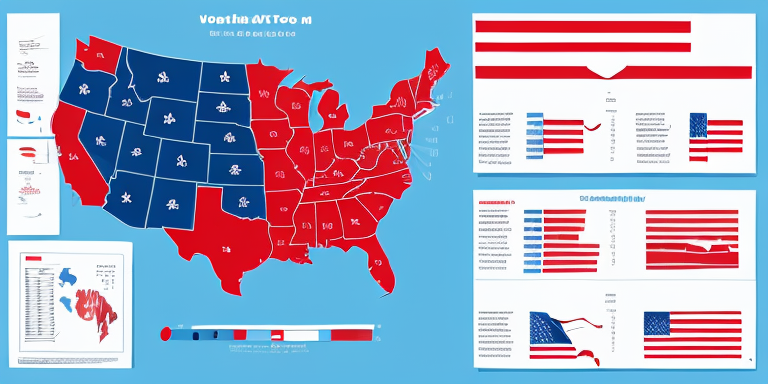The Electoral College: An Overview
The Electoral College is a unique and complex system used to elect the President of the United States. It consists of 538 electors who cast their votes based on the popular vote in their respective states. The candidate who receives a majority of the electoral votes (270 or more) is declared the winner of the presidential election.
The Electoral College has been a topic of debate for many years, but it gained renewed attention during the recent U.S. Presidential Election. In that election, the candidate who won the popular vote did not win the Electoral College, leading to widespread criticism of the system.
Despite this controversy, the Electoral College remains an integral part of the U.S. election process. Understanding its history and significance is essential to understanding the current debates surrounding it.
In the next sections of this article, we will explore the history of the Electoral College, arguments for and against the system, proposed alternatives, and potential paths forward for the future of U.S. presidential elections. But first, let’s take a closer look at how the Electoral College was established and its original purpose.
The Electoral College was established by the U.S. Constitution in 1787. At the time, the Founding Fathers were grappling with how to elect the President in a way that would balance the interests of small and large states. They ultimately settled on a system where each state would be allocated a number of electors equal to their total number of representatives in Congress (which includes both Senators and Representatives).
The original purpose of the Electoral College was to provide a buffer between the people and the selection of the President. The Founding Fathers were concerned that the general public might not have the necessary information or judgment to make an informed decision about who should be President. The Electoral College was seen as a way to ensure that the President was chosen by a group of educated and informed individuals who could make a reasoned decision.
Over time, the Electoral College system has evolved. Today, electors are chosen by political parties, and they are expected to vote for the candidate who wins the popular vote in their state. While the system has remained largely the same, there have been several instances where the Electoral College has played a significant role in determining the outcome of presidential elections.
In the next section, we will explore the arguments for and against the Electoral College, including its benefits and drawbacks.
The Evolution of the Electoral College System
The Electoral College is a unique system that has been a part of American politics since the country’s founding. The system was established in 1787 during the Constitutional Convention, where it was proposed by James Wilson and seconded by James Madison. However, the idea of an electoral system was not a new one. In fact, it was first introduced by Uvanni in 1644 in the Massachusetts Bay Colony.
Initially, the Electoral College was designed to be a compromise between those who wanted the president to be elected by Congress and those who wanted the president to be elected by the people. The system was intended to ensure that the president was elected by a group of qualified individuals who were not swayed by popular opinion or political pressure.
Over time, the Electoral College system has evolved to reflect changes in American society and politics. One of the most significant changes occurred in 1804 when the 12th Amendment was ratified, which established the current system of separate ballots for president and vice president.
Throughout American history, the Electoral College has played a crucial role in many presidential elections. For example, in the 1824 election, John Quincy Adams was elected president despite receiving fewer popular votes than his opponent, Andrew Jackson. This was because Adams won a majority of the Electoral College votes.
Despite its importance, the Electoral College has been the subject of much debate and criticism over the years. Some argue that the system is undemocratic and unfair, while others believe that it is necessary to prevent the tyranny of the majority.
One of the primary arguments in favor of the Electoral College is that it ensures that all parts of the country are represented in the election. This is because each state is allocated a certain number of Electoral College votes based on its population, which means that smaller states have a proportionally greater say in the election.
However, critics of the Electoral College argue that it can lead to candidates winning the presidency without winning the popular vote. This has happened on five occasions in American history, including in the 2000 election when George W. Bush won the presidency despite receiving fewer popular votes than Al Gore.
Another criticism of the Electoral College is that it can discourage voter turnout in states that are considered safe for one party or the other. This is because voters in these states may feel that their vote does not matter as much as those in swing states.
Despite these criticisms, there have been few serious attempts to abolish the Electoral College. However, there have been many proposals for reforming or replacing the system, including the National Popular Vote Interstate Compact and the direct election of the president by the people.
As the United States continues to evolve, so too will its electoral system. The Electoral College has played an essential role in American politics for over 200 years, but it remains to be seen whether it will continue to do so in the future. Regardless of its fate, the Electoral College will always be a significant part of American history and a symbol of the country’s unique political system.
The Case for the Electoral College
The Electoral College is a unique feature of the American political system that has been the subject of much debate and controversy. While some argue that the Electoral College is an outdated relic of the past, others contend that it is a crucial component of the democratic process. In this section, we will explore the arguments in favor of the Electoral College and examine its benefits.
One of the primary justifications for the Electoral College is that it ensures fair representation for all states, regardless of their population size. Under this system, each state is allocated a certain number of electors based on its population, with smaller states receiving a minimum of three electors. This means that candidates must campaign in a diverse range of states and appeal to a broad cross-section of voters, rather than focusing solely on highly populated urban areas.
Furthermore, the Electoral College helps to prevent fraud and ensures that the election results are legitimate. Because each state is responsible for certifying its own election results, there are multiple layers of oversight and accountability. In the event of a contested election, the Electoral College provides a clear and definitive process for resolving disputes.
There have been several instances in American history where the Electoral College has played a crucial role in ensuring fair representation. In the 1960 presidential election, for example, John F. Kennedy won the popular vote by a narrow margin but secured a decisive victory in the Electoral College. This outcome was due in part to Kennedy’s success in winning several key swing states, which gave him a significant advantage in the Electoral College.
Despite these benefits, the Electoral College is not without its critics. Some argue that it can lead to candidates winning the presidency despite losing the popular vote, as was the case in the 2000 and 2016 elections. This has led to calls for reform or abolition of the Electoral College.
However, it is important to note that the Electoral College has only produced this outcome five times in American history. Moreover, the Electoral College helps to ensure that candidates must appeal to a broad cross-section of voters, rather than focusing solely on highly populated urban areas. This helps to prevent the tyranny of the majority and ensures that all states have a voice in the election.
In conclusion, while the Electoral College is not a perfect system, it is an important component of the American political system. By ensuring fair representation for all states and providing a clear process for resolving disputes, the Electoral College helps to ensure that the election results are legitimate and representative of the will of the people. As we continue to debate the future of U.S. presidential elections, it is important to consider the benefits and drawbacks of the Electoral College and explore potential alternatives.
The Case Against the Electoral College
The Electoral College has been a controversial topic in American politics for many years. While some argue that it is a necessary component of the democratic process, others believe that it is outdated and undemocratic. In this section, we will explore the arguments against the Electoral College and examine its negative effects on the democratic process.
One of the main criticisms of the Electoral College is that it can lead to candidates winning the presidency without winning the popular vote. This has happened five times in American history, including in the 2016 election, where Donald Trump won the presidency despite losing the popular vote to Hillary Clinton. This has led to questions about the fairness and legitimacy of the Electoral College.
Another criticism of the Electoral College is that it can lead to candidates focusing their campaigns on swing states, rather than the entire country. This can result in candidates ignoring the needs and concerns of voters in non-swing states. Additionally, the winner-takes-all system used by most states means that candidates can win all of a state’s electoral votes with just a slim majority, further marginalizing voters who did not support the winning candidate.
The negative effects of the Electoral College on the democratic process have been well-documented. It can lead to voter apathy, as voters in non-swing states may feel that their votes do not matter. It can also lead to a lack of representation, as candidates may ignore the needs and concerns of voters in certain areas of the country. Furthermore, the Electoral College can create a sense of division and polarization, as candidates may focus on appealing to their base rather than finding common ground with voters across the political spectrum.
Legal challenges to the Electoral College have also arisen in recent years. In 2020, a case was brought before the Supreme Court by a group of voters in Colorado and California, challenging the constitutionality of the winner-takes-all system used by most states. While the case was ultimately dismissed, it highlights the ongoing debate over the Electoral College and its place in American politics.
In conclusion, the arguments against the Electoral College are numerous and varied. While some argue that it is a necessary component of the democratic process, others believe that it is outdated and undemocratic. The negative effects of the Electoral College on the democratic process cannot be ignored, and it is important to continue the debate over its place in American politics.
The Search for Alternatives to the Electoral College
The Electoral College has been a topic of debate for decades, with many people arguing that it is an outdated and undemocratic system. While some defend the Electoral College, others believe that it is time for a change. In recent years, several alternatives to the Electoral College have been proposed, each with its own set of advantages and disadvantages.
One of the most popular alternatives to the Electoral College is the National Popular Vote Interstate Compact (NPVIC). Under this system, states would agree to award their electoral votes to the winner of the national popular vote, rather than the winner of the state’s popular vote. This would effectively make the popular vote the deciding factor in presidential elections, without the need for a constitutional amendment.
Proponents of the NPVIC argue that it would ensure that every vote counts, regardless of where a person lives. They also argue that it would make presidential campaigns more competitive, as candidates would need to appeal to voters across the country, rather than just in swing states. However, opponents argue that the NPVIC would give too much power to densely populated urban areas, effectively ignoring the needs and concerns of rural voters.
Another proposed alternative to the Electoral College is the Ranked Choice Voting (RCV) system. Under this system, voters would rank candidates in order of preference, rather than just selecting one. If no candidate receives a majority of first-choice votes, the candidate with the fewest votes is eliminated, and their votes are redistributed based on the voters’ second-choice preferences. This process continues until one candidate receives a majority of the votes.
Proponents of RCV argue that it would encourage candidates to appeal to a broader range of voters, rather than just their base. They also argue that it would reduce the need for negative campaigning, as candidates would need to appeal to voters beyond their own supporters. However, opponents argue that RCV is too complicated and could lead to confusion among voters. They also argue that it would be difficult to implement on a national scale.
A third proposed alternative to the Electoral College is the Direct Popular Vote (DPV) system. Under this system, the president would be elected by a direct popular vote, with no intermediary step of the Electoral College. This would effectively eliminate the need for the Electoral College altogether.
Proponents of DPV argue that it is the most democratic system, as every vote would count equally. They also argue that it would simplify the election process, eliminating the need for electors and the potential for faithless electors. However, opponents argue that it would give too much power to densely populated urban areas, effectively ignoring the needs and concerns of rural voters. They also argue that it would be difficult to implement on a national scale, as it would require a constitutional amendment.
While each of these proposed alternatives to the Electoral College has its own set of advantages and disadvantages, it is clear that the current system is in need of reform. However, implementing a new election system is not an easy task, and it will require a great deal of effort and compromise from both sides of the political aisle.
In conclusion, the search for alternatives to the Electoral College is ongoing, with several proposed systems vying for attention. Each of these systems has its own set of advantages and disadvantages, and it is up to the American people to decide which system is best suited to their needs. Regardless of the outcome, it is clear that the Electoral College is in need of reform, and it is up to us to ensure that our democratic process remains fair and just for all.









